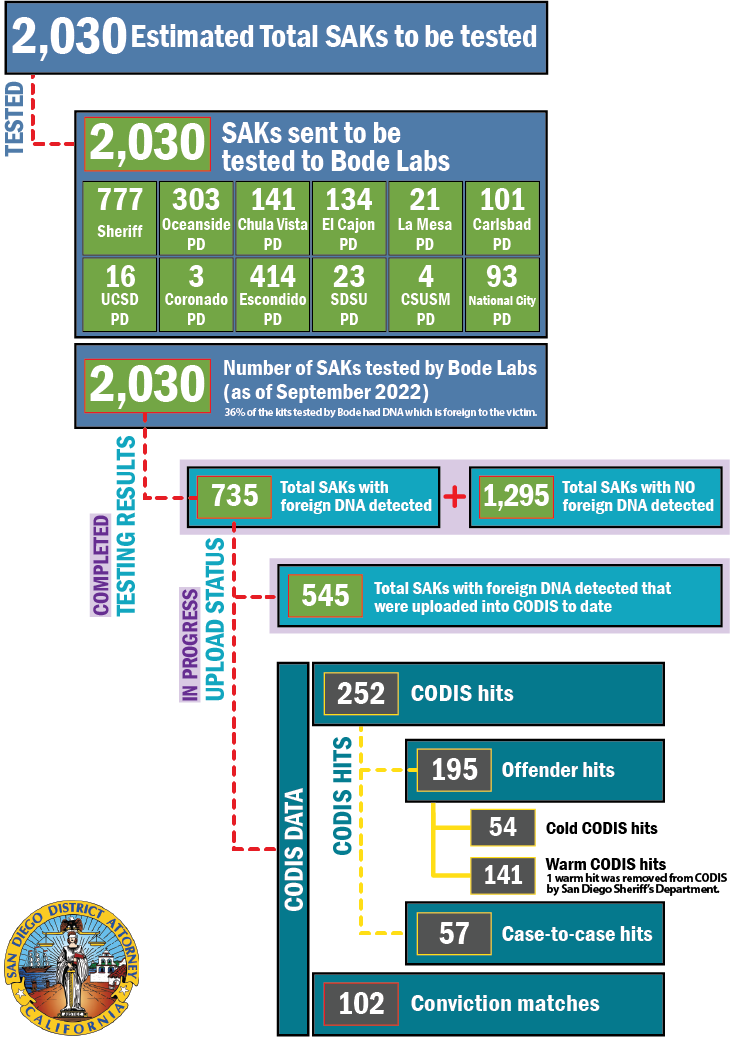Testing Sexual Assault Kits
Reducing the countywide backlog of untested sexual assault kits has been a priority of San Diego County District Attorney Summer Stephan since taking office in July of 2017. The DA's testing initiative is consistent with new best practices guidelines by the Department of Justice recommending the testing of all rape kits published August, 2017.
“Rape cases leave victims with deep emotional and physical wounds and having seen how much bringing their perpetrators to justice matters, I’m committed to doing everything we can to solve their cases. These kits may contain powerful evidence that can speak on behalf of victims and prevent a future assault.”
- District Attorney Summer Stephan
The District Attorney’s Office has retained Bode Cellmark Forensics, of Lorton, Virginia, a nationally certified laboratory used in multiple regions to test the backlogs and has extensive experience testing sexual assault kits (SAKs). The DA's office has spent about $1.5 million, so far, on this priority initiative. This is a snapshot overview of the previously un-submitted SAKs inventoried by all law enforcement agencies in the county, excluding the San Diego Police Department. The overview and numbers will continue to change as kits move through the submission and testing process.

Total SAK kits to be tested in the graphic is the total number of sexual assault kits that date back to the year 1990 for the Sheriff and all 11 of the police departments that contract with the San Diego County Sheriff's Laboratory for testing of forensic evidence. The above chart now reflects an additional 274 kits discovered by the Sheriff during the inventory process of this project. Also, this number does not include SAKs housed at the San Diego Police Department, which also made the determination to send their Sexual Assault Kit inventory to the same outside laboratory for testing as is being used in the DA’s project.
Testing Results:
SAKs with foreign DNA detected:DNA testing of the SAK identified DNA that was not from the victim.
SAKs with no foreign DNA detected:DNA testing of the SAK either identified no DNA or only DNA from the victim.
SAKs with foreign DNA profiles uploaded into CODIS to date:
The foreign DNA profile from the SAK that was uploaded into CODIS was searched against other profiles within CODIS. A SAK can have more than one CODIS hit. These hits could include other cases, a suspect, or multiple suspects. Because the SAK will continue to be searched in the future, the number of hits can continually change as associations can happen indefinitely into the future.
SAKs with foreign DNA identified that were not eligible for upload into CODIS: A foreign DNA profile that was identified from the DNA testing of the SAK did not meet the FBI’s eligibility criteria (e.g. being a mixture from more than one person; being a profile that isn’t unique enough to identify a single person) and could not be uploaded into CODIS.
CODIS hits:
The foreign DNA profile from the SAK that was uploaded into CODIS matched against one or more profiles within CODIS. A SAK can have more than one CODIS hit, so the total number of hits may exceed the number of SAKs with CODIS hits. This number can continually change as hits can happen indefinitely into the future. A hit can be either a forensic hit (case-to-case hit) or an offender hit.
Please Note: For this purpose, all CODIS hits (both forensic and offender) are counted regardless of whether they provide a specific investigative lead for a particular case. The CODIS hit counts include each individual hit between cases, as well as those to an offender. The total number of hits is utilized to be able to demonstrate case connectivity and where hits are generating by county and from other states. This may differ from how CODIS hits are counted for other reporting purposes.
Offender Hit: Person was either 1) unknown to the victim, or 2) was known to the victim but no reference sample for the suspect was submitted with the Sexual Assault Kit.
Case-to-Case hits: When a DNA profile from one case matches to a DNA profile from a different case. These include both solved and unsolved cases.
Cold CODIS hits: When the suspect was not known to the victim or victim did not provide an actual real name or identification. For example, when the victim knew the suspect only by a nickname.
Warm CODIS hits: When the suspect was known to the victim or the victim knew the real name of the suspect and the suspect was identified. For example, the name the victim provided matches name received from CODIS.
Conviction Match:
Suspect reference was submitted with the kit, and the person was already in DNA database.
